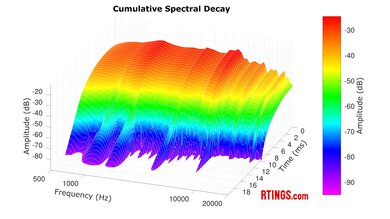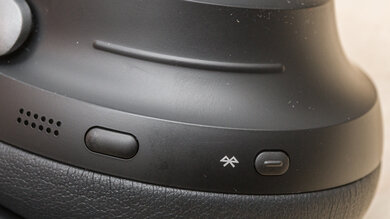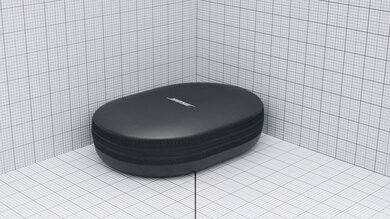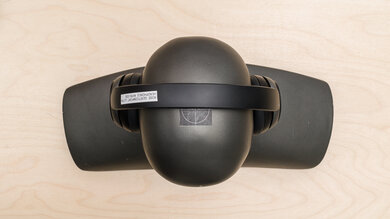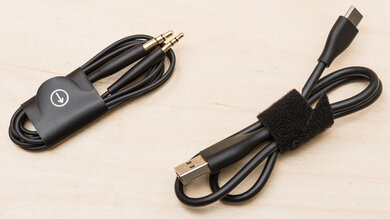The Bose QuietComfort Ultra Headphones Wireless are top-of-the-line noise cancelling (ANC) headphones. While they look similar to the Bose QuietComfort 45/QC45 Wireless, they have CustomTune technology; the headphones can adjust their sound profile and noise cancelling based on your unique hearing capabilities and environment. Like the Bose QuietComfort Ultra Earbuds Truly Wireless, they also have Immersive Audio, which offers head tracking to give you a more exciting audio experience. They even support aptX Adaptive, a codec that dynamically adjusts its performance based on your usage, whether you're streaming high-quality audio or watching video.
Our Verdict
The Bose QuietComfort Ultra Headphones are decent for sports and fitness, although over-ears may not be the best choice for this purpose. They're lightweight and feature outstanding noise cancelling to block out people at the gym and a transparency mode to stay aware outdoors. While they're very comfortable, they're also bulky and can fall off your head with moderate movement. They also lack an IP rating for water resistance, but that's very common for over-ears.
- Outstanding noise isolation performance.
- Can fall off of your head with moderate head movement.
The Bose QuietComfort Ultra Headphones are impressive for commuting and traveling. They have a well-built design that's comfortable for long days on the go. They're also equipped with a superb ANC system, so they can block out the low rumble of bus and plane engines and last almost up to 30 hours with their ANC on. Their carrying case helps protect the headphones from damage, too.
- Outstanding noise isolation performance.
- Very comfortable and well-built.
- Can fall off of your head with moderate head movement.
The Bose QuietComfort Ultra Headphones are great for office use. They have a comfortable fit and will easily last through a couple of long work days, so you don't have to worry about recharging them every day. They also support multi-device pairing, so you can stay connected to your PC and smartphone simultaneously. Thanks to their superb ANC system, you can easily block out chatty coworkers and the hum of computer fans.
- Outstanding noise isolation performance.
- Very comfortable and well-built.
- Mic has very good recording quality.
- Supports multi-device pairing.
Mic only does an alright job separating your voice from noise around you.
You can only use the Bose QC Ultra Headphones wirelessly via Bluetooth. Unfortunately, they have high latency using the SBC Bluetooth codec, so your audio and visuals won't be in sync. Luckily, they support aptX Adaptive, which is a codec that adjusts its performance based on your content. If you're gaming, it can ensure a lower latency experience. However, there's still some delay present. Since these headphones don't have a wireless dongle for a low-latency connection, we don't think they're suitable for wireless gaming.
The Bose QuietComfort Ultra Headphones are decent for wired gaming, though there are a couple of caveats. First, they only support audio via analog, and second, the headphones still need to be powered on to use the analog connection, so you'll still need to keep an eye on battery life while using them. These headphones have an extra dose of bass that can help emphasize sound effects in your gameplay while speech and soundtracks remain clear. They also have a comfortable fit that's suitable for long gaming sessions, but gamers with longer hair might notice a drop-off in bass.
- Graphic EQ and presets available via companion app.
Needs to be powered on even when plugged in.
The Bose QuietComfort Ultra have alright audio reproduction accuracy. They don't deviate much from their warm sound, which makes EQing them fairly straightforward using the companion app. The left and right drivers are reasonably well aligned in terms of phase and frequency, so panning is generally rendered accurately, apart from in the treble region. Unfortunately, they have terrible group delay performance, so kick drums lack punch and feel slow and heavy instead of tight and precise.
The Bose QuietComfort Ultra have superb noise isolation. Whether you're on a plane, in a busy office, or walking down the street, the ANC system effectively blocks out surrounding noise, allowing you to stay focused on your audio.
The Bose QuietComfort Ultra have a satisfactory mic. It captures your voice without any natural peaks or dips, but it only does an okay job of separating your voice from any noise around you. These aren't a great choice for taking calls in a noisy environment.
The Bose QuietComfort Ultra have decent frequency response consistency. These headphones use Bose's CustomTune technology to adjust noise isolation and sound based on your hearing. This constant retuning makes measuring frequency response consistency tricky. In general, listeners with long hair or glasses may notice reduced bass, while those with larger heads might hear a boost in bass response.
Performance Usages
Changelog
-
Updated Oct 30, 2025:
The Wired Connection section was updated to mention the successor, Bose QuietComfort Ultra Headphones (2nd Gen).
-
Updated Jul 02, 2025:
The Stereo Mismatch section was updated to clarify the bass range phase results.
-
Updated Jun 18, 2025:
We've updated the review to mention the Sony WH-1000XM6 in Noise Handling.
-
Updated May 01, 2025:
We updated the Controls and App Support sections of this review to clarify that you can cycle between ANC modes using the multifunction button, but you can't turn ANC completely off.
Check Price
Differences Between Sizes And Variants
The Bose QuietComfort Ultra Headphones come in six color variants: 'Black,' 'White Smoke,' 'Sandstone,' 'Lunar Blue,' 'Deep Plum,' and a 'Diamond 60th Anniversary Edition.' We tested the 'Black' model, and you can see our model's label here. If you encounter another variant of these headphones, please let us know in the comments, and we'll update our review.
Popular Headphones Comparisons
The Bose QuietComfort Ultra Headphones are premium over-ears and are a step up from the Bose QuietComfort 45/QC45 Wireless. There are new features like CustomTune technology, so the headphones can adjust their sound and noise cancelling adaptively based on your hearing characteristics and environment. Like the Bose QuietComfort Ultra Earbuds Truly Wireless, they also support Immersive Audio, a head tracking feature similar to Apple's Spatial Audio. As with most Bose products, you can expect a high level of noise isolation, outperforming similarly premium picks from competing brands like the Sony WH-1000XM5 Wireless, the Sennheiser MOMENTUM 4 Wireless, and the Apple AirPods Max. Their warm sound suits a variety of audio, but fans of remarkably long battery lives may prefer the Sennheiser, which last over twice as long as the options from Sony, Bose, and Apple.
Check out our recommendations for the best noise cancelling headphones, the best wireless Bluetooth headphones, and the best Bose headphones.
While the Bose QuietComfort Ultra Headphones Wireless and Sony WH-1000XM6 are both premium headphones and are priced accordingly, the Sony are a step above in most performance metrics. They have a better microphone system and audio reproduction accuracy overall. However, while both headphones have a warm tuning, the Sony's bass emphasis bleeds more into the mids, which can cause dense mixes to sound muddled relative to the Bose. In terms of features, the Sony's more recent release date and positioning affords them the benefit of expanded functionality, including extensive virtual soundstage features, and the LC3 and LDAC codecs. That said, the Bose still support an analogous Hi-Res codec with aptX Adaptive, which also brings wider compatibility for low latency than LC3. The Bose are also more comfortable and have deeper ear cups, which can make a big difference depending on your physical characteristics.
The Bose QuietComfort Earbuds Truly Wireless and the Bose QuietComfort Ultra Headphones Wireless serve different purposes, largely due to their different designs. The Earbuds are obviously meant to sit in your ears, as they're smaller and more portable, so you can easily toss them in a pocket while on the go. While both pairs offer ANC, the over-ear Ultra Headphones do a much better job on this front, blocking out a remarkably high amount of noise. Both headphones offer fairly balanced sound profiles, though the Ultra Headphones are a little warmer out of the box; you can tweak both sets to taste in the Bose Music app. The choice between the two ultimately comes down to your particular needs: fantastic ANC or high portability.
The Bose QuietComfort Ultra Headphones Wireless have the edge over the Sony WH-1000XM5 Wireless. The Bose are more comfortable and better built. They also have a slight edge in noise isolation, but the difference is minor; both choices are still well-suited for noisy environments. The Bose also support aptX Adaptive for high-quality audio. Meanwhile, the Sony headphones support the LDAC codec, which is nice if you want to stream high-quality audio, and you can use them passively when wired. If you want to use the Bose wired, you'll have to turn them on.
The Bose QuietComfort Ultra Headphones Wireless are better than the Sennheiser MOMENTUM 4 Wireless for most purposes. Both are higher-end headphones, but the Bose feel more comfortable fit, and they have a better noise isolation performance. However, the Sennheiser headphones last about twice as long off a single charge, so you might prefer them for long trips or if you don't want to recharge your headphones often. The Sennheiser offer greater sound customization via the app, too. Unlike the Bose, you can even save and rename EQ presets for future use.
Test Results

The Bose QC Ultra Headphones have a warm sound profile with a relatively flat mid-range. Their treble range is slightly subdued, but it's still clear, if a bit uneven.
If you prefer a different sound, their companion app offers EQ presets, which retain the extra low-end. You can also fine-tune their sound to your liking by using the custom equalizer. They also sound slightly different with less treble emphasis if you use them wired rather than wirelessly.
These headphones have Bose's CustomTune technology, which allows the headphones to automatically adjust their noise isolation and sound profile based on your personal listening capabilities. As a result, it's difficult to get consistent measurements for these headphones, as they constantly adapt and retune their sound. That said, you'll likely experience a drop in bass if you have long hair or wear glasses, while those with larger heads will experience an increase in bass response.
The Bose QuietComfort Ultra Headphones' bass target compliance is excellent. The response is elevated from the low-bass through mid-bass for extra thump and rumble. The high-bass adheres to our target tightly for a good amount of boom on kick drums without any extra mud. This can be pleasing if you're listening to especially bass-heavy mixes like Starboy by The Weeknd because the bass sounds exciting, but the vocals still sound clear and present.
The mid-range's target compliance is outstanding. The response is pretty flat and neutral, resulting in natural-sounding and present vocals and instruments.
The treble's target compliance is superb. It lands close to our target response from the low-treble through mid-treble for a bright, detailed sound. It wavers slightly, but vocals remain articulate, and sibilants (like S and T) sound detailed. This smoother treble might sound slightly dull in comparison to the elevated bass, but you can adjust the equalizer for a different frequency response.
The peaks and dips performance is great. These headphones don't deviate much from their warm sound profile, apart from a few peaks and dips in the treble range, which can make sounds like cymbals harsh, dull, or piercing depending on their pitch.
The left and right drivers have okay stereo matching. They're well-matched in terms of amplitude throughout the bass range and most of the mid-range. The biggest deviations are in the treble region, where a couple of big deviations mean sounds like distorted electric guitars might feel slightly imbalanced in the stereo field. The drivers exhibit phase deviations throughout the range, though not extreme, in the bass region, it sounds a bit hollow, which is also reflected in the Group Delay section. The other slight deviations shown on our graph are inaudible with regular content.
These headphones have terrible group delay performance. Kick drums feel noticeably loose, lacking the punchy, impactful attack you'd expect. Similarly, bass guitars lack definition. This is especially disappointing given these headphones' otherwise warm and bassy sound profile. There are no issues in the mid or treble ranges, though, so high percussion sounds crisp and clear.
The PRTF measurements indicate a disappointing amount of interaction between your audio and pinna, meaning these headphones lack the qualities of an angled reference speaker. Their soundstage doesn't feel very open or spacious, and the audio seems like it's coming from inside your head.
These headphones have great harmonic distortion performance. Even at impressively high volumes, your audio will sound clean and free from harmonic distortion artifacts.
These active headphones only work when they are powered on, so we didn't take impedance or sensitivity measurements.
Like the Bose QuietComfort Ultra Earbuds Truly Wireless, these headphones support Bose's Immersive Audio. This is a head-tracking feature that can make your audio feel more spacious and real-life. It doesn't utilize any surround content, though, and only uses regular audio content. There are two settings (other than off): 'Still,' which virtually places the speakers in front of you and tracks your head to keep audio placed in relation to your original position, and 'Motion,' which allows the virtual speakers to move as you move your head, always keeping them placed in front of you. That said, these headphones can't play surround content like Dolby Atmos as they have to downmix this content to stereo. That said, they use digital sound processing (DSP) to virtually create a wider stereo soundstage.
These are the settings used to test these headphones. We also used the CustomTune feature on our test rig so that it could adapt to its ear shape. Our results are only valid when used in this configuration.
The Bose QuietComfort Ultra Headphones look very similar to the Bose QuietComfort Headphones Wireless and the Bose QuietComfort 45/QC45 Wireless. Overall, they look fairly minimalist, especially with the manufacturer's name modestly embossed on the center ear cup. The most noticeable difference is that the yoke is silver instead of completely black, and a similar design choice is made on the other color schemes. The 'White Smoke' model has silver yokes, while the 'Sandstone' model has gold yokes.
The control scheme is different than the Bose QuietComfort 45/QC45 Wireless with a touch-sensitive slider so that you can adjust the volume and only two buttons. All the controls are on the right ear cup, and there are chimes to let you know when you've powered the headphones on and off and when you've reached min or max volume. There are also voice prompts to indicate the battery level, ANC status, and pairing. There isn't feedback if you're pausing or skipping tracks, though. The volume slider is also a bit inconsistent, and you must use the tip of your finger to get the right volume increment. This slider also lets you access a shortcut command (which is settable in the companion app) by pressing and holding it in place.
Power button:
- Single press: Turns the headphones on and off.
- Press and hold: Activates Bluetooth pairing.
Multifunction button:
- Single press: Plays and pauses audio. Also answers calls.
- Double press: Skips the track forward. Also ends calls.
- Triple press: Skips the track backward.
- Press and hold: Cycles through ANC modes. To access modes via this control, they must be set as favorites in the App. By default, Quiet, Aware, and Immersion modes are set as favorites (you can't turn ANC completely off).
The carrying case is great. It's very similar in quality to other Bose products but is rounded. It's still very sturdy, though, and is made from plastic and faux leather. It has a zipper that's covered to protect it from damage and soft, molded padding to ensure you place them correctly within the case. There's even a pouch to store your cables when not in use.
The Bose QuietComfort Ultra Headphones have a great build quality. They're mostly made of plastic with aluminum and leather detailing, which makes them feel durable and sturdy. There's also a good amount of plush padding. That said, the folding hinge can wear down with time and lose its snappiness. Leather can also wear down with continual use.
These headphones are decently stable. They'll stay on your head if you jam to music at your desk or on the couch. However, they can shift around in place with head movements and can even fall off if you're vigorously moving your head. As a result, they're not the best choice if you want to use them during tough workouts.
The Bose QuietComfort Ultra Headphones' full-range noise isolation performance is outstanding, which is on par for a brand built on noise cancelling (ANC) technology. Unlike the Bose QuietComfort 45/QC45 Wireless, they support Bose's CustomTune feature, so their ANC automatically adjusts to your hearing capabilities and surroundings. As a result, they can easily block out the low, bassy rumbles of bus and plane engines as well as mid-range noise like ambient chatter. They also reduce the high-pitched hum of AC units very well.
If you're looking for a bit more customization and control over your noise isolation performance, you can access ANC modes in the companion app, as well as adjust and set your own ANC presets. Although there's an ANC slider, it doesn't affect the strength of the ANC itself but the strength of talk-through (labeled as 'Aware' in the app) mode, which allows the headphones to let in your desired amount of ambient sound. Also, the headphones only have ANC or 'Aware' modes, which you can modify the strength of and adjust to your preference, but there's no mode without noise cancelling or transparency enabled.
In response to user feedback of a high noise floor when ANC is enabled and volume set low, we retested the headphones but couldn't replicate the issue. However, noise sensitivity is a subjective experience.
Some of our readers have reported that vibrations from places like buses and trains can cause distortion problems with these headphones' audio output. It could be due to the headphones' ANC, which is always active. We've been unable to reproduce this issue with our unit, but if you encounter it, please let us know in the comments.
Just like with our Noise Isolation - Full Range test, these headphones do an incredible job of blocking out ambient sound in more dynamic environments. Whether traveling by plane, hanging in a busy office, or walking down the street, the ANC system can reduce a significant amount of sound around you so that you can focus on your audio. If you plan to use your headphones while out and about, check out our recommendations for the best travel headphones.
The Bose QuietComfort Ultra have a wind noise reduction feature called Wind Block. The manufacturer advertises that it mutes the ANC microphones located on the exterior of the ear cups to limit the ANC from picking up this sound and amplifying it. Overall, it helps tackle wind a little more efficiently than when this feature is disabled. When used, the ANC can reduce some bass to mid-range frequencies. This reduction is also better than headphones without a wind reduction feature like the Sony WH-1000XM5 Wireless.
That said, wind directly interacts with the ANC's microphones. The ANC system tries to cancel it out, even though this sound doesn't reach your ears, but, as a result, it causes loud and unwanted noise. Using the Wind Block feature could also impact ANC performance when wind is present.
The leakage performance is decent. Leakage is most significant in the mid-range and sounds somewhat full. If you like to crank up the volume on your favorite tunes, others around you won't hear it unless you're in a very quiet environment.
The mic's recording quality is very good. Your voice sounds natural and clear, although a bit thin. Although Bose advertise these headphones to have a 'Self Voice' feature, which allows you to hear your own voice while on the phone (this is also known as sidetone), we couldn't get it to work. Our experience also appears to be a common one.
The mic's noise handling performance is fair. If you're taking calls in a moderately noisy environment like a train station, it can partially drown out your voice. It's still audible, but it'll be hard for the other person on the line to hear you clearly. If you consistently work in a louder environment and need a microphone that hardly picks up noise, check out the Sony WH-1000XM6.
The Bose QC Ultra Headphones' battery performance is great. The manufacturer advertises them to last 24 hours continuously, but we measured 29 hours. That said, battery life varies on use, including your volume levels. Unfortunately, unlike other models like the Bose QuietComfort 45/QC45 Wireless, you can't use these headphones passively. You can use them wired, but the headphones must be on to work.
The Bose Music app is great; you can see a video of it here. You can access a graphic EQ, presets, and Immersive Audio, a head-tracking feature for a more immersive experience. You can switch between different ANC modes and create ANC presets and immersion modes. You can also set ANC modes as favorites to be accessed via the Action button. There's an ANC slider, but it doesn't adjust the strength of the ANC. Rather, it adjusts the talk-through strength, which is the amount of ambient sound the headphones let in. Additionally, you can adjust features like the auto-off timer, on-head detection, and Bluetooth source detection (if you want to connect the headphones to more than one device at a time).
The Bose QC Ultra Headphones come with a 1/8" TRS to 1/16" TRS cable that you can use for analog audio. However, like the Sonos Ace, you have to turn on the headphones to use this connection. There's also some latency when using this connection. While minor, the delay can be frustrating if you're gaming competitively or working on sync-sensitive content. The headphones perform an analog-to-digital conversion, so they need to be on. This conversion adds a bit of latency when wired, and it's about the same amount regardless of whether you apply additional EQ or change listening modes.
They also come with a USB-A to USB-C cable for recharging the headphones. However, you can't use it to pass through audio. If you'd like USB-C audio, consider their successor, the Bose QuietComfort Ultra Headphones (2nd Gen).
These headphones have good Bluetooth connectivity. They support multi-device pairing, so you can stay connected with two devices, like a PC and smartphone, simultaneously. While they have high latency if you're using the default SBC codec, they also support aptX Adaptive, which automatically adjusts to your audio content. If you're listening to high-quality audio, it'll enter its High-Quality mode; however, expect a lot of latency. However, this codec can also shift into a low latency mode. If you're streaming videos, latency is significantly reduced, but it's still noticeable. That said, some devices compensate for latency.
You can pair these headphones with Bluetooth-enabled PCs with full audio and mic support. However, if you connect them via analog, you'll only be able to receive audio.
The Bose QuietComfort Ultra Headphones only support audio via analog on PlayStation consoles.
You can plug their audio cable into your Xbox controller's AUX port, but this only provides audio support, so you won't be able to use their mic.

